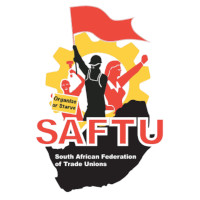by SAFTU – first published here
IN SUMMARY:
Retailers keeping prices high: South African retailers maintain high prices on essential food items despite falling input costs, as highlighted by the Competition Commission’s Essential Food Price Monitoring Report.
Input costs declining: Costs for food inputs like fuel and the Rand have eased, and load shedding has stopped, but retailers have not reduced prices accordingly.
Rising prices: Retail prices for key items such as maize, brown bread, and tinned fish are increasing, even though farmgate prices (e.g., wheat) and producer prices (e.g., cooking oil) have dropped.
Retailer profit margins: South African retailers have higher profit margins (6-8% higher) than international retailers. They exploit the gap between input costs and retail prices for profits, a concept referred to as the “rocket and feather” effect (prices rise quickly but fall slowly).
Executive earnings vs. worker wages: The earnings gap is enormous:
- Woolworths’ CEO earns R123 million annually, 1,308 times more than the lowest-paid worker.
- Shoprite’s CEO earns R65 million, 1,000 times more than the lowest-paid worker.
- Spar’s CEO earns R25 million, 416 times more than the lowest-paid worker.
Food insecurity: The Pietermaritzburg Economic Justice and Dignity Group (PMEJDG) revealed that minimum wage earners cannot afford basic food baskets, which have risen in price by 50% since 2020.
Wage shortfall: A minimum wage worker in 2024 earns R4,633.76 but still faces a shortfall of R696.86 just to afford food, without considering other living costs (rent, transport, etc.).
Social grants: 47% of South Africa’s population depends on social grants. Recipients of the Social Relief of Distress Grant (R370) have seen food prices increase by R24 while their grant increased by only R10.23.
Rising food basket costs: From September 2023 to September 2024, the household food basket increased by 1.9%, from R5155.77 to R5225.68.
Poverty and unemployment: 30% of South Africans live in poverty, and 12.2 million are unemployed, including 10 million on R370 SRD grants.
Attacks on living standards: The working class is being affected by low wages, high food prices, and government budget cuts to essential services like health and education.
Government budget cuts: The government is cutting spending on social services, especially in health and education, despite over 84% of the population relying on public health care.
Privatization of state-owned entities: State-owned entities are being sold to the private sector, leading to higher costs for services that impact the poor working class.
Call for worker organization: The article concludes that the working class must organize to resist attacks from both the capitalist class and the state, which serves their interests.






